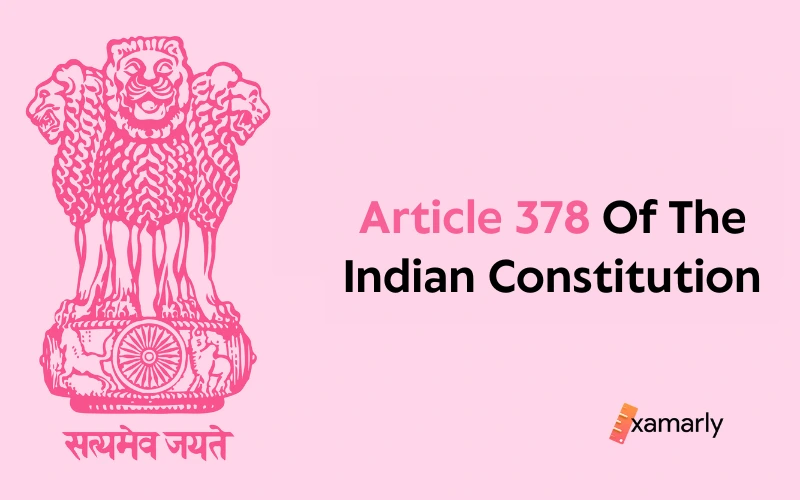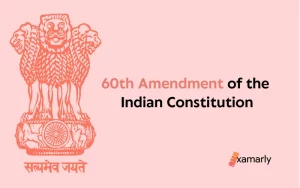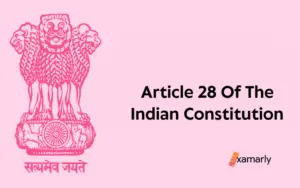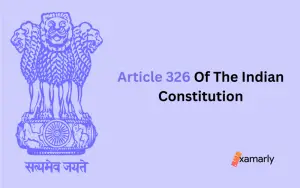An Overview
The Indian Constitution is a complex document that outlines the fundamental principles and laws of the country. One of the important articles of the Constitution is Article 378, which deals with the transition of the Public Service Commission (PSC) from the Dominion of India to the Union after the Constitution came into effect.
Article 378 of the Indian Constitution also describes the transition of members of a Public Service Commission in a Province or group of Provinces to the corresponding State or Joint State Public Service Commission at the commencement of the Constitution.
In this blog, we will delve deeper into the intricacies of Article 378 of the Indian Constitution and understand its significance in the functioning of the governance of the country.
- An Overview
- Article 378 Of The Indian Constitution: Provisions Related To Public Service Commissions
- Clause (1) Of Article 378 Of The Indian Constitution: Explained
- Clause (2) Of Article 378 Of The Indian Constitution: Explained
- Article 378A Of The Indian Constitution: Special Provision Related To The Legislative Assembly Of Andhra Pradesh
- Summing Up
- FAQs Related To Article 378 Of The Indian Constitution
- Which Chapter Of The Constitution Of India Does Article 378 Of The Indian Constitution Fall Under?
- Who Are The Members Of The Public Service Commission For The Dominion Of India As Per Article 378 Of The Indian Constitution?
- According To The Provisions Of Article 378 Of The Indian Constitution, What Happens To The Members Of The Public Service Commission For The Dominion Of India When The Constitution Comes Into Effect?
- Is There An Exception To The Continuation Of The Office For The Members Of The Public Service Commission For The Dominion Of India As Per Article 378 Of The Indian Constitution?
- According To The Clauses Of Article 378 Of The Indian Constitution, Who Are The Members Of A Public Service Commission Of A Province Or Of A Public Service Commission Serving The Needs Of A Group Of Provinces?
- What Happens To The Members Of A Public Service Commission Of A Province Or Of A Public Service Commission Serving The Needs Of A Group Of Provinces When The Constitution Comes Into Effect As Per The Provisions Provided By Article 378 Of The Indian Constitution?
- Is There An Exception To The Continuation Of Office For The Members Of A Public Service Commission Of A Province Or Of A Public Service Commission Serving The Needs Of A Group Of Provinces As Per Article 378 Of The Indian Constitution?
- What Is The Duration Of The Andhra Pradesh Legislative Assembly?
- Is There An Exception To The Duration Of The Andhra Pradesh Legislative Assembly As Mentioned In Article 172 Of The Indian Constitution?
- What Happens At The End Of The Five-Year Period Of The Legislative Assembly Of Andhra Pradesh?
Article 378 Of The Indian Constitution: Provisions Related To Public Service Commissions
Article 378 of the Indian Constitution contains clauses which hold some provisions with respect to the Public Service Commissions. Let us take up each of its clauses one by one and try to analyse its contents.
We will also take a look at Article 378A of the Indian Constitution which was an addition to the Constitution of India through an amendment act of the Indian Constitution.
The clause of both of these articles has been explained in detail in the following paragraphs.
Clause (1) Of Article 378 Of The Indian Constitution: Explained
(1) The members of the Public Service Commission for the Dominion of India holding office immediately before the commencement of this Constitution shall, unless they have elected otherwise, become on such commencement the members of the Public Service Commission for the Union and shall, notwithstanding anything in clauses (1) and (2) of article 316 but subject to the proviso to clause (2) of that article, continue to hold office until the expiration of their term of office as determined under the rules which were applicable immediately before such commencement to such members.
The first clause of Article 378 of the Indian Constitution refers to the transition of the Public Service Commission (PSC) for the Dominion of India before the Constitution came into effect to the PSC for the Union after the Constitution came into effect. Specifically, it states that:
- The members of the PSC for the Dominion of India who were holding office immediately before the Constitution came into effect will, unless they choose otherwise, become members of the PSC for the Union.
- These members will continue to hold office until the end of their term, as determined by the rules that were in place before the Constitution came into effect.
- However, this is subject to the proviso to clause (2) of Article 316 of the Indian Constitution. It will not take into consideration anything mentioned in clause (1) and clause (2) of the same article.
In summary, this passage explains that members of the PSC for the Dominion of India who were in office before the Constitution came into effect will automatically become members of the PSC for the Union and will continue to hold office until the end of their term, with the exception of the proviso to clause (2) of article 316.
Clause (2) Of Article 378 Of The Indian Constitution: Explained
(2) The Members of a Public Service Commission of a Province or of a Public Service Commission serving the needs of a group of Provinces holding office immediately before the commencement of this Constitution shall, unless they have elected otherwise, become on such commencement the members of the Public Service Commission for the corresponding State or the members of the Joint State Public Service Commission serving the needs of the corresponding States, as the case may be, and shall, notwithstanding anything in clauses (1) and (2) of article 316 but subject to the proviso to clause (2) of that article, continue to hold office until the expiration of their term of office as determined under the rules which were applicable immediately before such commencement to such members.
The second clause of Article 378 describes the transition of members of a Public Service Commission in a Province or group of Provinces to the corresponding State or Joint State Public Service Commission at the commencement of the Constitution.
The clause states that these members will automatically become members of the new commission unless they choose otherwise, and will continue to hold office until the end of their term as determined by the rules that were in place before the commencement of the Constitution. This transition is subject to the proviso in clause (2) of Article 316 of the Indian Constitution.
It is important to note that this clause is referring to a specific event or change in the Indian Constitution, likely the creation or reorganization of the States or Provinces within a country.
The Public Service Commission (PSC) is a body responsible for recruiting, appointing and promoting civil servants in the State or a Province. This clause outlines the process by which members of the PSC in a province or group of provinces will transition to serving on the PSC for the corresponding State or Joint State Commission. This will ensure continuity of service and prevent disruption of the work of the Commission. It also allows for a smooth transition and continuity of service for civil servants.
Article 378A Of The Indian Constitution: Special Provision Related To The Legislative Assembly Of Andhra Pradesh
378A. Special provision as to duration of Andhra Pradesh Legislative Assembly.—Notwithstanding anything contained in article 172, the Legislative Assembly of the State of Andhra Pradesh as constituted under the provisions of sections 28 and 29 of the States Reorganisation Act, 1956, shall, unless sooner dissolved, continue for a period of five years from the date referred to in the said section 29 and no longer and the expiration of the said period shall operate as a dissolution of that Legislative Assembly.
Article 378A of the Indian Constitution refers to a special provision in the Constitution of India regarding the duration of the Andhra Pradesh Legislative Assembly. It states that despite any provisions mentioned in Article 172 of the Indian Constitution, which outlines the normal duration of a State Legislative Assembly, the Andhra Pradesh Legislative Assembly will have a fixed duration of five years from the date specified in sections 28 and 29 of the States Reorganisation Act, 1956.
This means that the assembly will not be dissolved earlier than five years from that date, and will automatically be dissolved at the end of that period. This special provision was likely put in place because of the reorganization of the States that took place in 1956 and the need to ensure stability during the transition period.
The addition of the special provision of Article 378A to the Constitution of India was possible because of the Constitution (Seventh Amendment) Act, 1956.
You Might Also Like:
| Article 379 of the Indian Constitution | Article 380 of the Indian Constitution |
| Article 376 of the Indian Constitution | Article 377 of the Indian Constitution |
Summing Up
The key learnings gained from the provisions of Article 378 of the Indian Constitution have been summarised below.
- Article 378 of the Indian Constitution contains provisions with respect to the transition of the Public Service Commission (PSC) for the Dominion of India to the PSC for the Union after the Constitution came into effect.
- Members of the PSC for the Dominion of India who were in office before the Constitution came into effect will automatically become members of the PSC for the Union and will continue to hold office until the end of their term, subject to the proviso in clause (2) of Article 316 of the Indian Constitution.
- Article 378 also describes the transition of members of a Public Service Commission in a Province or group of Provinces to the corresponding State or Joint State Public Service Commission at the commencement of the Constitution.
- Article 378A of the Indian Constitution refers to a special provision with respect to the duration of the Andhra Pradesh Legislative Assembly, which will have a fixed duration of five years from the date specified in sections 28 and 29 of the States Reorganisation Act, 1956.
- This special provision was likely put in place because of the reorganization of the States that took place in 1956 and the need to ensure stability during the transition period.
FAQs Related To Article 378 Of The Indian Constitution
Which Chapter Of The Constitution Of India Does Article 378 Of The Indian Constitution Fall Under?
Article 378 of the Indian Constitution falls under Chapter XXI of the Constitution of India. The chapter contains articles dealing with temporary, transitional, and special provisions.
Who Are The Members Of The Public Service Commission For The Dominion Of India As Per Article 378 Of The Indian Constitution?
As per the provisions of Article 378 of the Indian Constitution, the members of the Public Service Commission for the Dominion of India are individuals who were holding office immediately before the Constitution of India came into effect.
According To The Provisions Of Article 378 Of The Indian Constitution, What Happens To The Members Of The Public Service Commission For The Dominion Of India When The Constitution Comes Into Effect?
As per the provisions of Article 378 of the Indian Constitution, unless the members of the Public Service Commission for the Dominion of India have elected otherwise, they will become members of the Public Service Commission for the Union and will continue to hold office until the expiration of their term of office as determined under the rules which were applicable immediately before the commencement of the Constitution.
Is There An Exception To The Continuation Of The Office For The Members Of The Public Service Commission For The Dominion Of India As Per Article 378 Of The Indian Constitution?
Yes, the continuation of office is subject to the proviso to clause (2) of Article 316 of the Indian Constitution.
According To The Clauses Of Article 378 Of The Indian Constitution, Who Are The Members Of A Public Service Commission Of A Province Or Of A Public Service Commission Serving The Needs Of A Group Of Provinces?
The members of a Public Service Commission of a Province or of a Public Service Commission serving the needs of a group of Provinces are individuals who were holding office immediately before the Constitution of India came into effect.
What Happens To The Members Of A Public Service Commission Of A Province Or Of A Public Service Commission Serving The Needs Of A Group Of Provinces When The Constitution Comes Into Effect As Per The Provisions Provided By Article 378 Of The Indian Constitution?
Unless the members of a Public Service Commission of a Province or of a Public Service Commission serving the needs of a group of Provinces have elected otherwise, they will become members of the Public Service Commission for the corresponding State or the members of the Joint State Public Service Commission serving the needs of the corresponding States, as the case may be, and will continue to hold office until the expiration of their term of office as determined under the rules which were applicable immediately before the commencement of the Constitution.
Is There An Exception To The Continuation Of Office For The Members Of A Public Service Commission Of A Province Or Of A Public Service Commission Serving The Needs Of A Group Of Provinces As Per Article 378 Of The Indian Constitution?
Yes, the continuation of office is subject to the proviso to clause (2) of article 316 of the Indian Constitution.
What Is The Duration Of The Andhra Pradesh Legislative Assembly?
The duration of the Andhra Pradesh Legislative Assembly is five years from the date referred to in sections 28 and 29 of the States Reorganization Act, 1956.
Is There An Exception To The Duration Of The Andhra Pradesh Legislative Assembly As Mentioned In Article 172 Of The Indian Constitution?
Yes, there is an exception to the duration of the Andhra Pradesh Legislative Assembly as mentioned in Article 172 of the Indian Constitution. The legislative assembly of Andhra Pradesh will continue for a period of five years from the date referred to in sections 28 and 29 of the States Reorganisation Act, 1956.
What Happens At The End Of The Five-Year Period Of The Legislative Assembly Of Andhra Pradesh?
At the end of the five-year period, the Andhra Pradesh Legislative Assembly will be dissolved and a new assembly will be elected.






